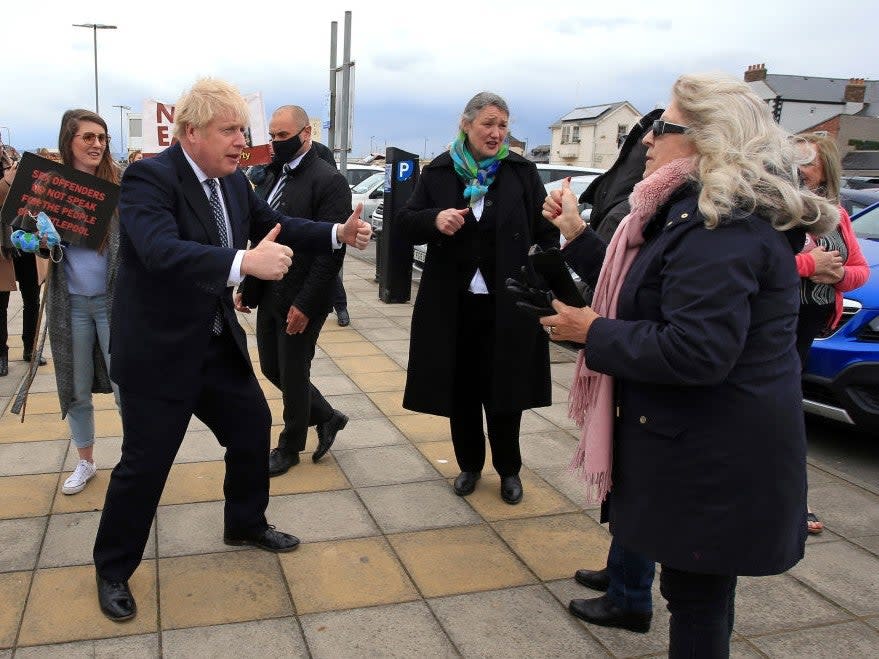A town disillusioned: Labour facing historic Hartlepool defeat but little love felt for Tories

Keir Starmer and Paul Williams (right) visit the Seaton Carew seafront
(Getty Images)Two weeks before the 2019 general election and, at the Hartlepool College of Further Education, a couple of students were talking politics with The Independent.
As the Conservatives’ destruction of the “red wall” appeared increasingly likely across much of the north, this Tees Valley coastal town felt like it would remain a significant exception.
“There’s that thing, isn’t there?” mused one student, Chloe Harper. “Do you really want to be a Tory voter?”
Her words proved prophetic. In a constituency that had polled almost 70 per cent in favour of leaving the EU and which has experienced almost half a century of economic decline, not even Boris Johnson’s twin promises of getting Brexit done and levelling up the north could persuade most people here to vote for him. Hartlepool remained Labour, as it had been for more or less 60 years.
Today, almost 18 months on, the picture appears very different.
After a by-election was called following the resignation of MP Mike Hill amid sexual harassment allegations, this one-time stronghold now looks the shakiest of grounds for Keir Starmer’s party.
The Tories are odds-on favourites for a historic win here on Thursday. A poll this week had them 17 points up. A vaccine bounce and a hunger in the town for change appears to have put them in the driving seat for a victory that would both raise questions about Starmer’s leadership and further signal that the deindustrialised north may be fundamentally shifting away from Labour.
And Chloe herself?
What wisdom can she offer this time round? She will be voting for Claire Martin, one of the various local candidates standing. Chloe says such an MP would know and understand the town.
“There’s still no way I could go Tory at the moment,” the 22-year-old Teesside University student says. “But I know a lot of people who say they will. I just don’t think people believe that Labour really cares about them.”

‘A lot of disillusionment’
During a wet and windy week in Hartlepool, it’s still not altogether easy to find people planning – or at least willing to say they are planning – to vote Tory. More often, they say who they will not be voting for. Which tends to be Labour.
The political mood here matches the weather: foul.
“There’s a lot of disillusionment with both parties,” says Darren Hankey, principal at the college. “I think there’s an element of cut-through with the Conservatives’ whole levelling up rhetoric but have people seen that translate into action? I’m not sure they have.”
For him, extra investment in education and greater help for smaller businesses following the coronavirus pandemic would be a vote winner but he appears sceptical any candidate will deliver.
Who does he think will win? “I think it will be a far closer run thing than people are predicting,” he says. “If I was a betting man, I probably wouldn’t bet.”
I think there’s an element of cut-through with the Conservatives’ whole levelling up rhetoric but have people seen that translate into action? I’m not sure they have
Darren Hankey, college principal
Hartlepool, it should be said, has much going for it.
It is a seagull’s leap from some of the north’s most beautiful coast, while in the town itself, the marina has been transformed into a hub of bars and restaurants. Town landmarks include the prestigious Northern School of Art and the BIS creative industries hub in the old General Post Office.
But the past 50 years have not been kind. The shipyards here closed in the Sixties; recession decimated its steel industry in the Seventies; and Margaret Thatcher finished off the nearby collieries in the Eighties. Under the austerity of the Noughties, the council’s budget was slashed by 40 per cent and the local hospital’s A&E and maternity units were closed. Some 252 people here have died after testing positive for Covid-19 over the past year.
Labour says that pretty much all those issues – cuts, closures, a bungled coronavirus response – can be placed at the door of various Tory governments. The Tories say the town’s decline has come on the back of a stream of Labour MPs unwilling to fight for it.
And the voters? Many appear to think both of those things are about right.

“The positive case for either of them?” muses Alan Teather, a professional quilter with his own shop in Upper Church Street. “Hm, I’m sure I could think of something if you gave me a couple of days.”
He has been red all his life. While he would never say never about changing, it won’t be this time round. “Boris Johnson is a chancer,” the 59-year-old declares. “He doesn’t care a monkey’s chuff for anyone but himself.”
Part of the reason for both his – and the wider – cynicism appears to be that neither of the two main candidates have inspired much enthusiasm here.
Paul Williams, for Labour, was an MP in nearby Stockton South for two years before being voted out in 2019. He is an arch-Remainer who spent his brief time in parliament campaigning for a second EU referendum.
“Not what I’d call a good fit for Hartlepool,” says Teather, a former soldier and industrial worker, and a Brexit voter. “If they didn’t want him in Stockton, I’m not sure why they thought we’d want him here. He’ll lose us [Labour] votes.”
Boris Johnson ... doesn’t care a monkey’s chuff for anyone but himself
Alan Teather, quilter
While the party has been keen to play up the fact Williams spent the Covid crisis working on the NHS front line, revelations last month that he led a clinical commissioning group backing the closure of certain hospital departments in Hartlepool have hardly helped his standing.
Yet his Tory opponent Jill Mortimer – a councillor from North Yorkshire – is, privately, not even that popular with some Tory members here. Promises of creating jobs and generating investment have been overshadowed by disappointment that this is someone who, until last month, appears not to have ever set foot in the town.
In one TV interview she compared the place to Leeds – a thriving metropolis of almost 800,000 people. As one taxi driver notes, either she hasn’t been to Hartlepool or she hasn’t been to Leeds.
When The Independent requests to meet Mortimer, the reply comes back that it’s just too close to election day.
“Hardly surprising,” says Jim McMahon, the Labour shadow transport secretary who is leading his party’s campaign up here. “The Tory strategy throughout this whole campaign has been to throw mud and hope some of it sticks, and to make sure no one comes into contact with their own candidate. And having seen her on TV a couple of times, it doesn’t surprise me they reached that conclusion.”
Ironically, perhaps, a request to meet Williams is also declined.

The local factor
Perhaps because Hartlepool has been called the most important by-election in a generation – a defining moment, according to the political academic Matthew Flinders – much emphasis has been placed on how national concerns might play out here in Thursday’s vote.
The vaccine bounce, cash for curtains, Brexit sentiment and the levelling-up agenda may all have some impact. Yet there is a local factor that has been perhaps overlooked. His name is Ben Houchen.
In 2017, this then 30-year-old foreshadowed the collapse of the red wall by doing the entirely unexpected and being elected the Conservative mayor of the Tees Valley.
Now, four years on – and himself up for re-election on Thursday – he has grown into a popular figure, seen as both capable of fulfilling promises and with an apparent direct link to government.
Among the achievements he claims as his own are breathing new life into the local airport, securing freeport status for the region and bringing the new Treasury North to Darlington – although his Labour rival Jessie Joe Jacobs argues there are actually fewer jobs in the region now than when he came to office.
“I like him a lot,” says Teather’s wife Amanda who, as a general rule, is also dyed-in-the-wool Labour. “He’s pulling the whole Tees Valley up by its boot straps.”
This is something Shane Moore, the independent leader of the borough council, hears a lot.
“Whether you agree with Ben’s policies or not, people see him getting things done and talking up the region,” he says, sitting at his desk in the town’s Civic Centre.
Because he’s a local lad he is viewed by some as a sort of palatable Tory: “It’s entirely possible they vote for him because they like what he does and then vote for [Mortimer] to work with him,” says Moore. “He could be the person who wins this for the Conservatives.”
The numbers game
As ever, ultimately, all this speculation will come down to a numbers game.
Mike Hill held on to the town in 2019 with a hugely reduced majority of 3,595. But some suggest that if the Brexit Party had not stood – and won 10,000 votes – the Tories may have clinched victory even then.
This time round there will be no Brexit Party to split the poll; and, although its Farage-less successor Reform UK has chucked its hat in the ring, it will almost certainly be a bit player.
The big question, then, is where those 10,000 votes will go.
It is something that Jim McMahon has also been wrestling with as he finishes his penultimate day campaigning.
“The fact is we don’t know what will happen,” he says. “I would imagine close. I think it’s all to play for.”
Yet when I ask if Labour can really win, his reply is surprising. It has just a touch of philosophical defeat about it.
“I have a lot of respect for the people of Hartlepool,” he says. “I think it’s a fantastic town with fantastic people. However they vote on Thursday, I wish the town every success.”
Read More
Jersey fishing row: European Commission says UK is breaking Brexit trade deal
Jersey fishing row: France sends patrol boats as post-Brexit tensions rise
Local elections 2021 – live: Leaders cast votes as millions go to polls on ‘very big day’ for UK

 Yahoo Movies
Yahoo Movies 